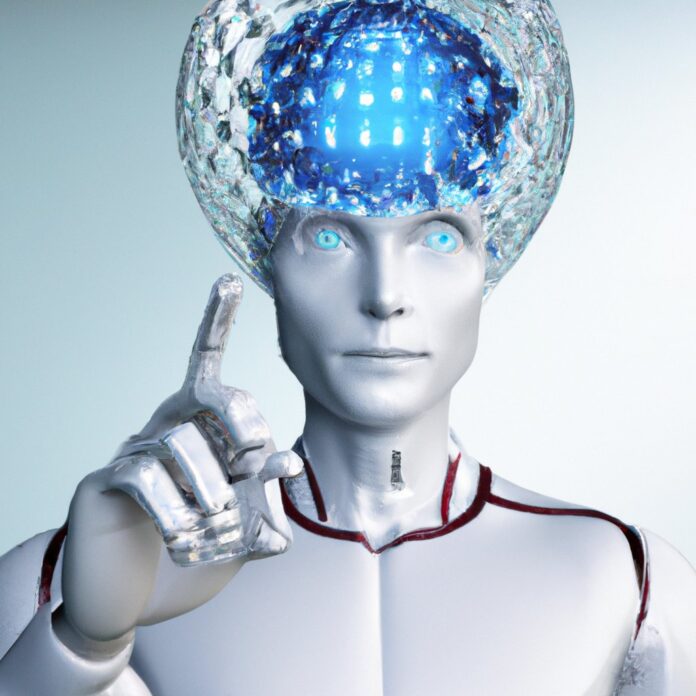What is Artificial Intelligence and How Does it Work?
Artificial intelligence (AI) refers to the development of intelligent machines that can think, learn, and perform tasks that normally require human intelligence. AI involves a range of techniques including machine learning, natural language processing, computer vision, and deep learning.
At its core, AI works by processing large amounts of data and using algorithms to recognize patterns and make predictions based on that data. Machine learning is a key aspect of AI that involves training algorithms to learn from data, rather than being explicitly programmed. This allows AI systems to improve their performance over time by recognizing and adapting to new patterns.
Another important aspect of AI is natural language processing, which allows machines to understand and interpret human language. This is useful in applications like chatbots, virtual assistants, and speech recognition.
Computer vision is another key area of AI that involves teaching machines to understand and interpret visual information from the world around them. This is used in applications like self-driving cars, facial recognition, and image classification.
Artificial Intelligence is a complex and rapidly evolving field that has the potential to revolutionize many aspects of our lives. By enabling machines to learn, reason, and interact with humans in new ways, AI has the potential to transform industries ranging from healthcare to finance to transportation.
Applications of AI in Everyday Life & Industries
Artificial intelligence (AI) has numerous applications in everyday life and a wide range of industries. Here are some examples:
- Healthcare: AI can be used to analyze medical images, identify diseases and tumors, and assist in diagnosing medical conditions. It can also help in drug discovery and personalized medicine.
- Finance: AI can help in fraud detection, risk management, and portfolio management. It can also provide personalized financial advice to customers based on their spending habits and financial goals.
- Transportation: Self-driving cars are an example of AI in transportation. AI can also be used to optimize traffic flow, reduce accidents, and enhance transportation logistics.
- Customer Service: AI-powered chatbots can assist customers in answering their queries, booking appointments, and resolving issues. This can save time and improve customer satisfaction.
- Education: AI can assist in personalized learning and adaptive testing, providing customized content and assessments based on a student’s learning style and pace.
- Manufacturing: AI can optimize production processes, reduce waste, and improve product quality. It can also help in predictive maintenance, where machines are repaired before they break down.
- Agriculture: AI can help in precision farming, where sensors and drones can monitor crop growth and identify problems like pests and diseases. This can improve yields and reduce waste.
- Retail: AI can help in predicting customer behavior, identifying trends, and providing personalized recommendations. It can also help in supply chain optimization.
AI has numerous applications in various industries and can help in improving efficiency, reducing costs, and enhancing customer experiences.
What are the Benefits & Challenges of Using AI?
There are several benefits and challenges associated with using artificial intelligence (AI).
Benefits:
- Efficiency: AI can automate repetitive and time-consuming tasks, thereby increasing efficiency and productivity.
- Accuracy: AI can make more accurate predictions and identify patterns that humans may miss, leading to better decision-making.
- Personalization: AI can provide personalized experiences to customers based on their preferences and behavior.
- Cost savings: AI can help in reducing labor costs and eliminating errors, thereby reducing costs.
- Speed: AI can process large amounts of data quickly, enabling faster decision-making.
Challenges:
- Bias: AI can be biased towards certain groups or demographics, leading to unfair outcomes.
- Job displacement: AI can lead to job displacement as tasks are automated, potentially leading to job losses.
- Privacy concerns: AI relies on data, and there are concerns about data privacy and security.
- Reliability: AI may not always provide reliable results, and errors in AI can have significant consequences.
- Ethics: AI raises ethical concerns around issues such as accountability, transparency, and responsibility.
While AI offers many benefits, there are also several challenges that need to be addressed to ensure that AI is used in a responsible and ethical manner.
The Current and Future State of AI Technology
The current state of AI technology is rapidly advancing and has seen significant progress in recent years. Some of the current trends and advancements in AI technology include:
- Deep Learning: Deep learning is a subset of machine learning that involves training artificial neural networks with large datasets. This has led to breakthroughs in areas such as computer vision, natural language processing, and speech recognition.
- Robotics: Robotics is another area where AI is making significant advancements. Robots are being developed that can perform tasks such as surgery, manufacturing, and even customer service.
- Natural Language Processing: Natural language processing (NLP) is a field of AI that involves training computers to understand human language. NLP has applications in virtual assistants, chatbots, and voice assistants.
- Autonomous Vehicles: Autonomous vehicles, or self-driving cars, are a major area of focus in AI. Companies like Tesla, Google, and Uber are developing self-driving cars that can navigate roads and make decisions without human intervention.
Looking towards the future, AI technology is expected to continue to advance and have a significant impact on various industries. Some of the key areas where AI is expected to make an impact in the future include:
- Healthcare: AI is expected to play a significant role in personalized medicine, drug discovery, and disease diagnosis.
- Education: AI is expected to play a role in personalized learning and adaptive testing.
- Agriculture: AI is expected to help optimize crop yields and improve food production.
- Energy: AI is expected to help optimize energy production and reduce waste.
Overall, the future of AI looks promising, but it also raises concerns about issues such as job displacement, ethics, and privacy. As such, it is important to continue to develop AI technology in a responsible and ethical manner.
How Can We Prepare for the Future Impact of AI?
As AI technology continues to advance, it is important to prepare for the future impact of AI in various areas. Here are some ways we can prepare for the future impact of AI:
- Education and Training: Investing in education and training in AI-related skills will be crucial to prepare for the future impact of AI. This includes both technical skills such as programming and machine learning, as well as skills such as critical thinking, problem-solving, and communication.
- Collaboration: Collaboration between governments, industry, and academia will be essential to develop ethical standards and regulations for the development and deployment of AI technology.
- Ethics and Responsible Development: It is important to ensure that AI is developed and deployed in a responsible and ethical manner. This includes considerations such as privacy, bias, and accountability.
- Job Reskilling and Retraining: As AI technology leads to automation of certain tasks, it is important to invest in job reskilling and retraining programs to ensure that workers can adapt to changing job markets.
- Monitoring and Assessment: It is important to continuously monitor and assess the impact of AI on various areas such as employment, healthcare, and education, and make adjustments as necessary.
- Research and Development: Continued investment in research and development in AI technology will be essential to keep pace with advancements and ensure that the technology is used for the betterment of society.
Preparing for the future impact of AI requires a multi-faceted approach that involves education, collaboration, responsible development, job reskilling, monitoring, and research and development.
Conclusion: Whether We Like it or Not -AI is Here to Stay.

It is clear that AI technology is here to stay, and its impact on various areas of society will only continue to grow in the future. While AI offers many benefits such as increased efficiency, accuracy, and personalization, it also raises concerns such as bias, job displacement, and privacy.
To prepare for the future impact of AI, it is important to invest in education and training, collaborate to develop ethical standards and regulations, ensure responsible development, invest in job reskilling and retraining, monitor and assess the impact of AI, and continue to invest in research and development.
MAYBE YOU WANT TO READ THIS : How to Avoid Scammers on Social Media
Ultimately, it is up to us to ensure that AI is used in a responsible and ethical manner to maximize its benefits and minimize its risks. By doing so, we can harness the power of AI to improve our lives and society as a whole.
Hits: 18













